As keynote speaker of MTSU’s annual Martin Luther King Jr. Day observance, state Rep. Harold Love Jr. challenged those gathered Monday evening, Jan. 20, inside the Student Union Ballroom to look deeper into the legacy of the slain civil rights leader to apply his wisdom to today’s societal challenges.
“Where do we go from here, chaos or community? In the summer of 1967, Dr. King asked this question of our nation,” said Love, who represents Tennessee House District 58, which encompasses a part of north central Metro Nashville and Davidson County.
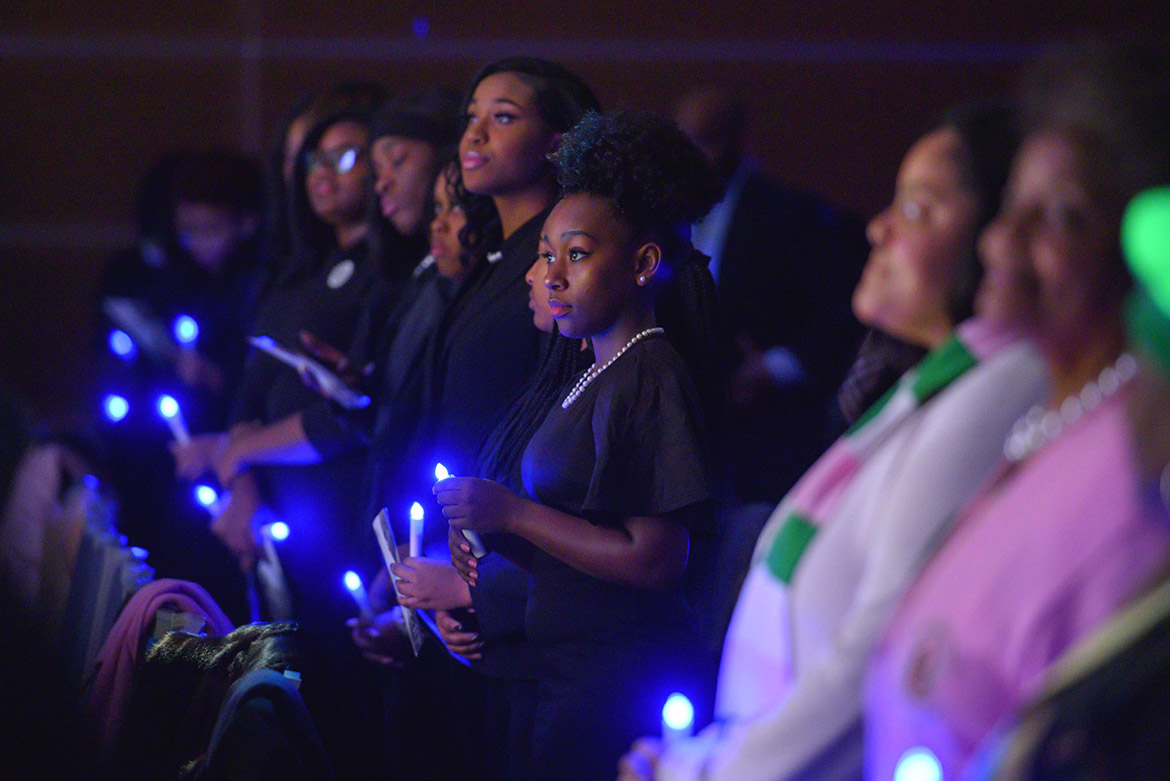
MTSU students and attendees hold their electronic candles during a moment of reflection Monday, Jan. 20, at the 2020 Martin Luther King Jr. Day Candlelight Vigil hosted by Middle Tennessee State University inside the Student Union Ballroom. (MTSU photo by Cat Curtis Murphy)
King worried that the progress made during the civil rights movement could become only “symbolic” because of the persistence of racism and the growing resistance in the white community to the structural changes that would be needed to truly move the nation toward a more just and equitable society. He was struck down by an assassin’s bullet the following year in Memphis, Tennessee.
“The question he asked in 1967 is still applicable today,” said Love, noting the lingering racial disparities ranging from health care outcomes to homeownership. “If we choose chaos, we’ll continue to allow our differences to divide us along the lines of race, gender and economics … If we choose community, we will realize that everyone has value and worth.
“Before the country can be great again, it must first be better,” he said.
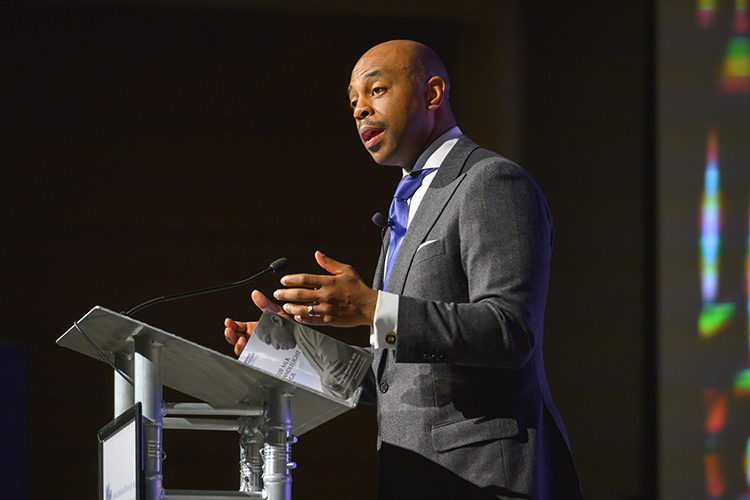
State Rep. Harold Love Jr. of Nashville, Tenn., gives the keynote address Monday, Jan. 20, at the 2020 Martin Luther King Jr. Day Candlelight Vigil, hosted by Middle Tennessee State University inside the Student Union Ballroom. (MTSU photo by Cat Curtis Murphy)
Middle Tennessee State University observed the 25th anniversary of Martin Luther King Jr. Day with a special evening ceremony and traditional candlelight vigil that drew hundreds of attendees from the campus and wider community on a frigid night just before spring semester classes began.
Love, an assistant leader of the Tennessee House Democratic Caucus and a member of the Tennessee Advisory Commission on Intergovernmental Relations, was welcomed to campus by MTSU President Sidney A. McPhee and first lady Elizabeth McPhee.
The ceremony featured performances from dance troupes from First Baptist Church in Murfreesboro and the En Pointe Performance Studio; tributes by members of the Eta Psi Chapter of Alpha Kappa Alpha Sorority to King and his wife, Coretta Scott King, as well as an appreciation of MLK’s legacy through historically black colleges and universities.
Musical performances included renditions of “A Change Is Gonna Come” by Marquese Parram and “Take My Hand, Precious Lord” by AKA member Andria Patterson.
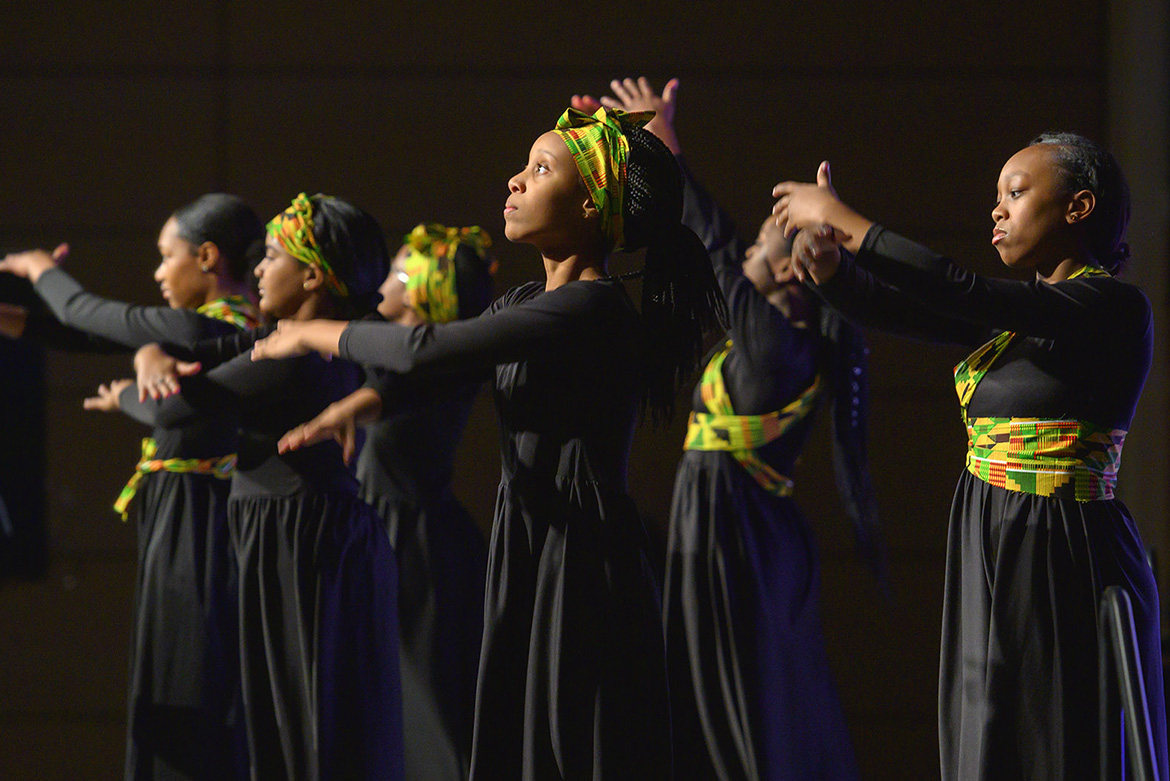
Members of the First Baptist Church Youth Group perform a dance tribute Monday, Jan. 20, at the 2020 Martin Luther King Jr. Day Candlelight Vigil, hosted by Middle Tennessee State University inside the Student Union Ballroom. (MTSU photo by Cat Curtis Murphy)
Before leading the audience in the recitation of MTSU’s True Blue Pledge and offering a prayer King used during his day, Dakota Logan, college pastor at The Point Campus Ministry, challenged students, as he’s done in previous years, to make a commitment upon returning to their classrooms.
“Maybe 2020 is the year you make a lifelong friend that looks different than you,” he said. “So the challenge is, when you walk into your classes this week, sit next to someone that’s different than you. Ask their name. Ask them where they’re from. Ask them to study with you when you’re in the trenches of midterms. … Dr. King believed that all people were created in the image of God. That’s a small step that you guys can take this semester to celebrate that.”
Daniel Green, director of MTSU’s Office of Intercultural and Diversity Affairs, asked the audience to leave Monday’s ceremony with a renewed interest in the life of a man “who brought hope and healing to America.”
“The magnitude of his legacy cannot be (understood) in one speech or one day of the year,” Green said. “Therefore, we should exemplify the unconditional love and nonviolence that he displayed every day of the year.”
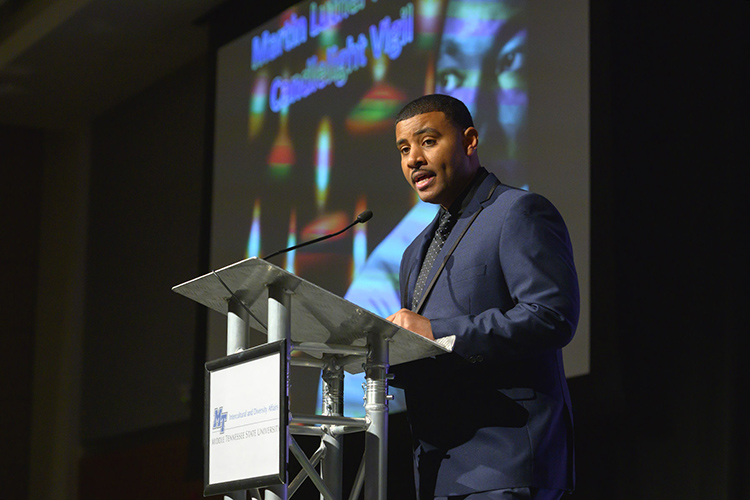
Daniel Green, director of MTSU’s Office of Intercultural and Diversity Affairs, serves as emcee Monday, Jan. 20, at the 2020 Martin Luther King Jr. Day Candlelight Vigil hosted by Middle Tennessee State University inside the Student Union Ballroom. (MTSU photo by Cat Curtis Murphy)
The ceremony ended with the audience holding electronic blue-lit candles as they observed moments of reflection for victims of various incidents of racially motivated violence across the nation during the past year.
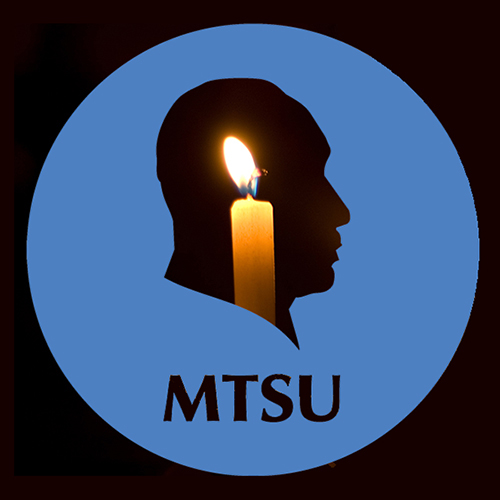 The Rev. Martin Luther King Jr., who was inspired by his Christian faith and by civil disobedience tactics employed by Indian leader Mohandas K. Gandhi, led marches and demonstrations that promoted the dissolution of legally enforced racial segregation in public accommodations. His work and that of his followers prompted Congress to pass the 1964 Civil Rights Act and the 1965 Voting Rights Act.
The Rev. Martin Luther King Jr., who was inspired by his Christian faith and by civil disobedience tactics employed by Indian leader Mohandas K. Gandhi, led marches and demonstrations that promoted the dissolution of legally enforced racial segregation in public accommodations. His work and that of his followers prompted Congress to pass the 1964 Civil Rights Act and the 1965 Voting Rights Act.
On April 4, 1968, after speaking to sanitation workers who were striking for better wages and working conditions in Memphis, Tennessee, King was assassinated as he stood on the balcony of the city’s Lorraine Motel.
President Ronald Reagan signed the law on Nov. 21, 1983, creating Martin Luther King Jr. Day as a national celebration of King’s birthday. The first observance was on Jan. 20, 1986, and the holiday is observed on the third Monday in January.
King, who would have been 91 years old this year, was born Jan. 15, 1929.
For more information about the event, contact Green at 615-898-5812 or daniel.green@mtsu.edu.
— Jimmy Hart (Jimmy.Hart@mtsu.edu) and Gina Logue (Gina.Logue@mtsu.edu)
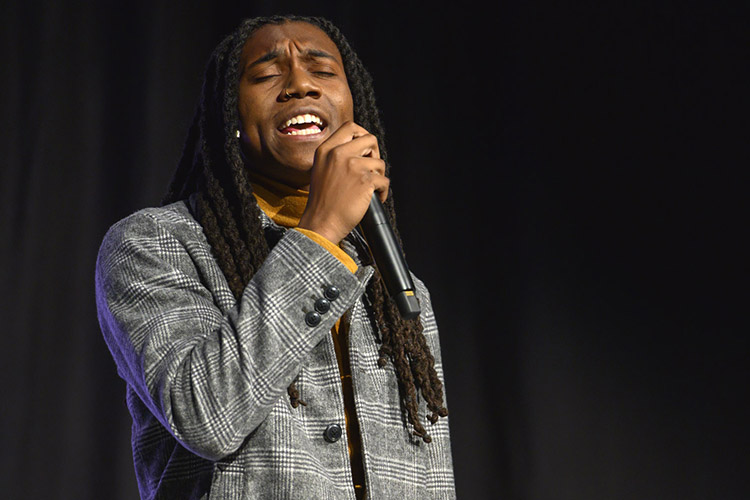
Former MTSU student Marquese Parram sings “A Change Is Gonna Come” Monday, Jan. 20, at the 2020 Martin Luther King Jr. Day Candlelight Vigil, hosted by Middle Tennessee State University inside the Student Union Ballroom. (MTSU photo by Cat Curtis Murphy)
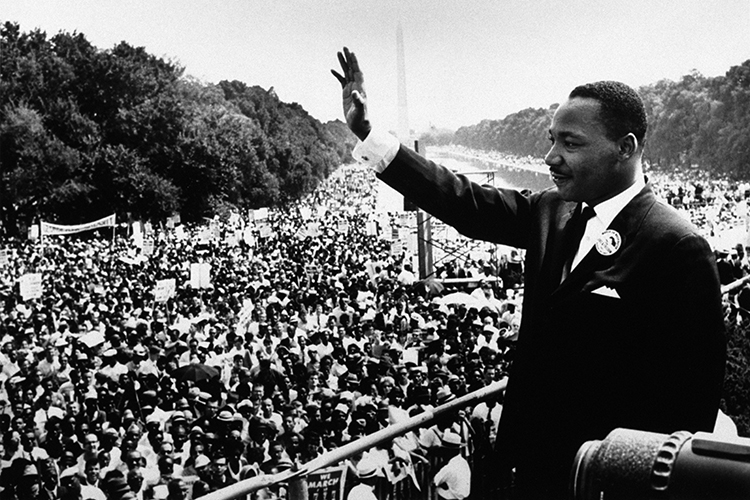
The Rev. Martin Luther King Jr. addresses a crowd from the steps of the Lincoln Memorial where he delivered his famous “I Have a Dream” speech during the Aug. 28, 1963, march on Washington, D.C. MTSU celebrated King’s memory during a Jan. 20 candlelight vigil in the Student Union Ballroom. (Photo courtesy of the U.S. Department of Defense Archives)

COMMENTS ARE OFF THIS POST